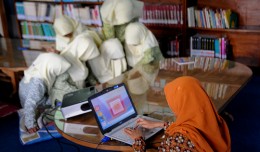Computer programming language projects, including MIT’s Scratch and Microsoft’s Kodu, give students the tools they need to create their own video games, movies, music and art. Using Scratch, students can also make their ideas come to life as animation or interactive stories. On Scratch, students both create and publish their work while honing skills in computational and critical thinking. This is being further adapted to be incorporated in college classrooms. It is used to give non computer science majors a taste for basic programming.
Microsoft’s Kodu offers similar opportunities for the realm of video game development. The simplified programming language allows children to develop and build video games on their Xbox using nothing more than their video game controller. The language is icon based, making it easy for students to understand. Students are able to test their work and troubleshoot once the code has been entered.
Both programs encourage creativity by giving students the tools they need to develop their ideas using a new medium. Such programs have the potential to spark a students interest for computer sciences and instill technological and critical thinking skills in children from a young age.
Creative Commons Love: Pete Brown on Flickr.com






















